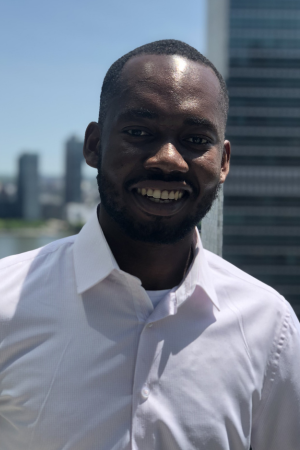Esomchi's Experience
Published: 28 August 2024
'My favorite part about studying at the University of Glasgow was the intellectually stimulating environment and the opportunity to engage with peers and faculty from diverse backgrounds.'
Education Public Policy & Equity, MSc
What were you doing before your Masters?
Before pursuing my Masters degree, I spent a year as an HIV/AIDS Peer Educator in Akwa Ibom, Nigeria, a community with one of the highest prevalence rates of HIV/AIDS in the country. In this role, I was deeply involved in advocacy and awareness campaigns centered around sexual health education, safe sex practices, and the dangers of psychoactive substance use. I also led initiatives aimed at reducing the stigmatization of individuals living with HIV/AIDS within the community. This experience was pivotal in shaping my understanding of public health challenges and deepened my commitment to addressing social equity issues, ultimately inspiring me to further my education in education policy and equity.
Why did you choose the University of Glasgow?
I chose the University of Glasgow because of its strong reputation in education and public policy, as well as its commitment to social justice and equity. The University's focus on research-driven education and its international perspective were particularly appealing to me. Additionally, the opportunity to study in a city with a rich history and vibrant cultural scene made Glasgow an ideal choice for both my academic and personal growth.
Why did you choose your programme?
I selected the MSc in Education Public Policy & Equity at the University of Glasgow because of its comprehensive approach to addressing educational inequalities and its alignment with my career aspirations. The program offered a unique blend of theoretical knowledge and practical skills, focusing on the intersection of education, public policy, and social justice. This was crucial for me as I wanted to deepen my understanding of how education policies can be leveraged to promote equity and improve outcomes for marginalized communities globally.
What’s the most important thing you feel you’ve learned?
The most important lesson I learned during my studies was the critical role that evidence-based policymaking plays in creating effective and equitable educational systems. Through rigorous coursework and research, I gained a deeper appreciation for the complexities of education policy and the importance of grounding decisions in robust data and research. This has profoundly shaped my approach to addressing educational challenges and developing solutions that are both impactful and sustainable.
How has your coursework helped you to think about global issues and consider solutions to contribute to the UN’s Sustainable Development Goals?
My coursework at the University of Glasgow provided me with a global perspective on education policy, enabling me to critically analyze the challenges faced by different regions and consider solutions that align with the UN’s Sustainable Development Goals (SDGs). The program’s emphasis on social justice and equity helped me to understand the broader implications of educational disparities and the importance of inclusive education in achieving the SDGs.
Did you participate in any experiential learning opportunities?
I engaged in several experiential learning opportunities that significantly enriched my academic experience at the University of Glasgow. I served as the West Scotland Regional Coordinator for the Commonwealth Scholarship Commission, where I coordinated events and engaged with a diverse group of scholars. Additionally, with support from the University’s summer fund, I participated in the Transparency International School on Integrity in Lithuania during the summer of 2018, which broadened my understanding of global governance and anti-corruption efforts.
For my postgraduate research, I explored the Scottish Government's asset-based approach to community improvement, focusing on the role of social capital in fostering citizen participation in disadvantaged communities. My study examined the "Thriving Places Family Meal and Homework Club" in Bridgeton, employing qualitative research methods, including semi-structured interviews and case study analysis. The research revealed that participants who engaged in this social initiative not only benefited personally—by developing confidence, improving employability, and forming meaningful relationships—but also gained the collective strength to advocate for community issues. This research was pivotal in deepening my understanding of how social capital can drive community empowerment and was instrumental in preparing me for my current role in international development.
What are you doing now? How did your studies help prepare you for your chosen career?
I am currently working as a Knowledge Management Specialist at UNICEF HQ in Geneva. My role involves strengthening systems for knowledge generation, sharing, and dissemination, as well as supporting strategic planning and monitoring. My studies at the University of Glasgow equipped me with the analytical and strategic skills needed to excel in this role. The program’s focus on public policy and equity directly informed my approach to developing knowledge management strategies that support UNICEF’s mission to promote the rights and well-being of children globally.
What was your favourite part about studying at UofG, about living in Glasgow?
My favorite part about studying at the University of Glasgow was the intellectually stimulating environment and the opportunity to engage with peers and faculty from diverse backgrounds. The University’s commitment to social justice resonated with my own values and provided a supportive space to explore complex global issues. Living in Glasgow was equally rewarding—its vibrant arts scene, rich history, and welcoming community made it an inspiring place to live and study.
Do you have any advice for future students?
My advice for future students is to fully embrace the opportunities that come with studying at the University of Glasgow. Engage with the diverse academic and extracurricular offerings, and don’t hesitate to explore topics that challenge your perspectives. Building relationships with your peers and professors will enrich your experience and open doors to new opportunities. Most importantly, stay curious and committed to making a positive impact in whatever field you choose to pursue.
First published: 28 August 2024


